p2p lending
Mike Cagney vs. Todd Baker: The Debate at the Marketplace Lending and Investing Conference
November 6, 2015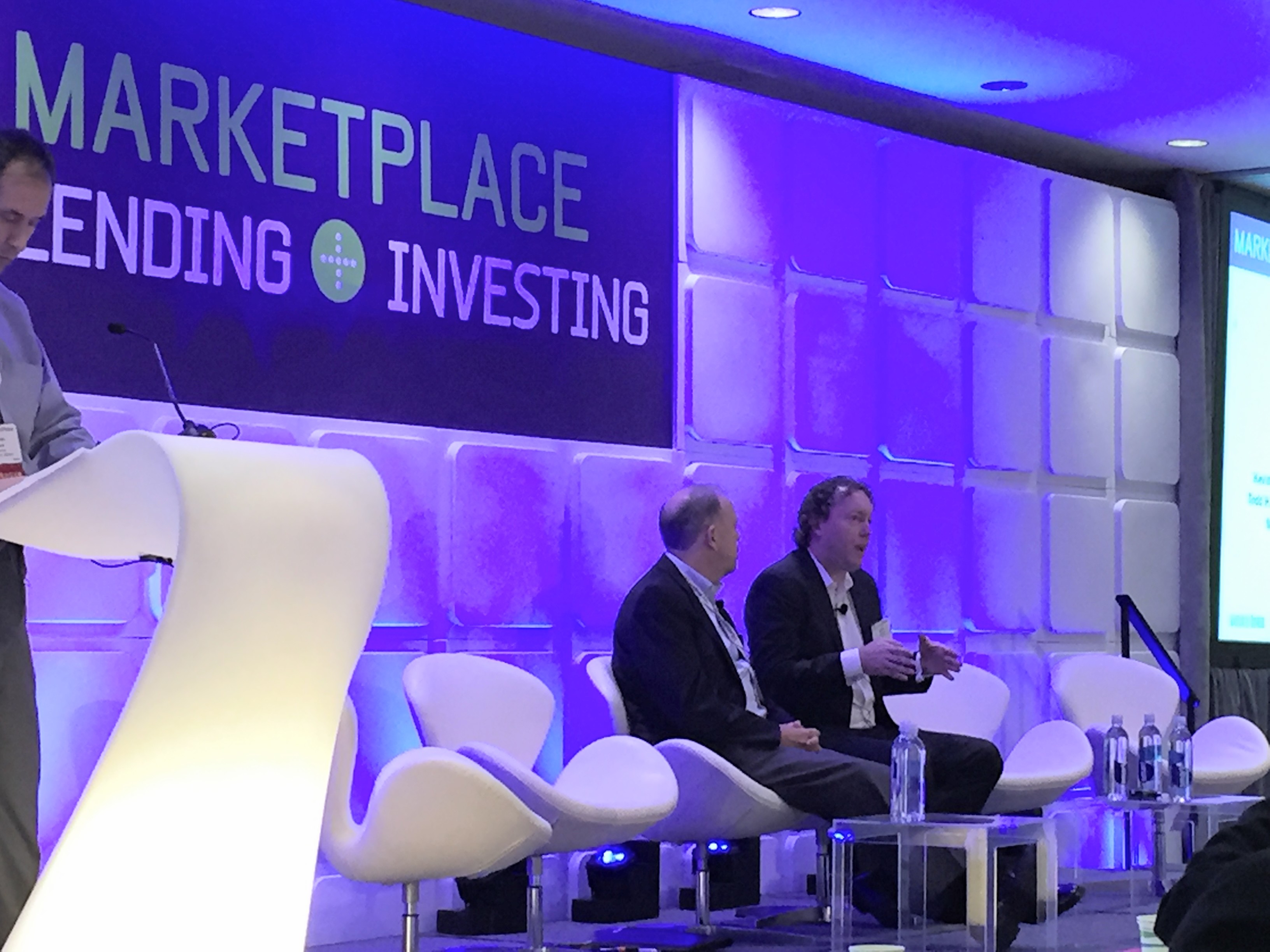 “You’re big buyers of some of this paper until you’re not,” said Todd Baker, the managing principal of Broadmoor Consulting, LLC, to a crowd of institutional investors and bankers at the Marketplace Lending and Investing Conference in New York. Seated to his right was his debate adversary, SoFi CEO Mike Cagney, who offered many opposing viewpoints. You can’t choose to not run a business because you fear it could some day shut down, Cagney argued.
“You’re big buyers of some of this paper until you’re not,” said Todd Baker, the managing principal of Broadmoor Consulting, LLC, to a crowd of institutional investors and bankers at the Marketplace Lending and Investing Conference in New York. Seated to his right was his debate adversary, SoFi CEO Mike Cagney, who offered many opposing viewpoints. You can’t choose to not run a business because you fear it could some day shut down, Cagney argued.
The two opponents had battled before though Op-eds published in American Banker. “The hard truth is this: while MPLs [Marketplace Lenders] have introduced valuable innovation into financial services, they carry a fundamental flaw that threatens to undermine their business, destabilize financial markets and cause real economic hardship,” wrote Baker back on August 17th. The flaw he addressed is access to funding. Baker argued that if investors don’t want to buy loans, then the marketplace lender is dead because their existence relies on the transaction fees from loan originations.
Cagney responded directly two days later. “The scenario [Baker] describes can’t happen. It is true that an MPL needs a buyer to originate loans — without one, the marketplace needs to raise rates until a buyer emerges. If there is no buyer, MPLs simply stop lending — they won’t start originating underwater loans.”
That perhaps played partly to Baker’s argument because if indeed there was an absence of buyers then the marketplace lender stops originating loans… and would at least temporarily be dead or would at least not be generating revenue.
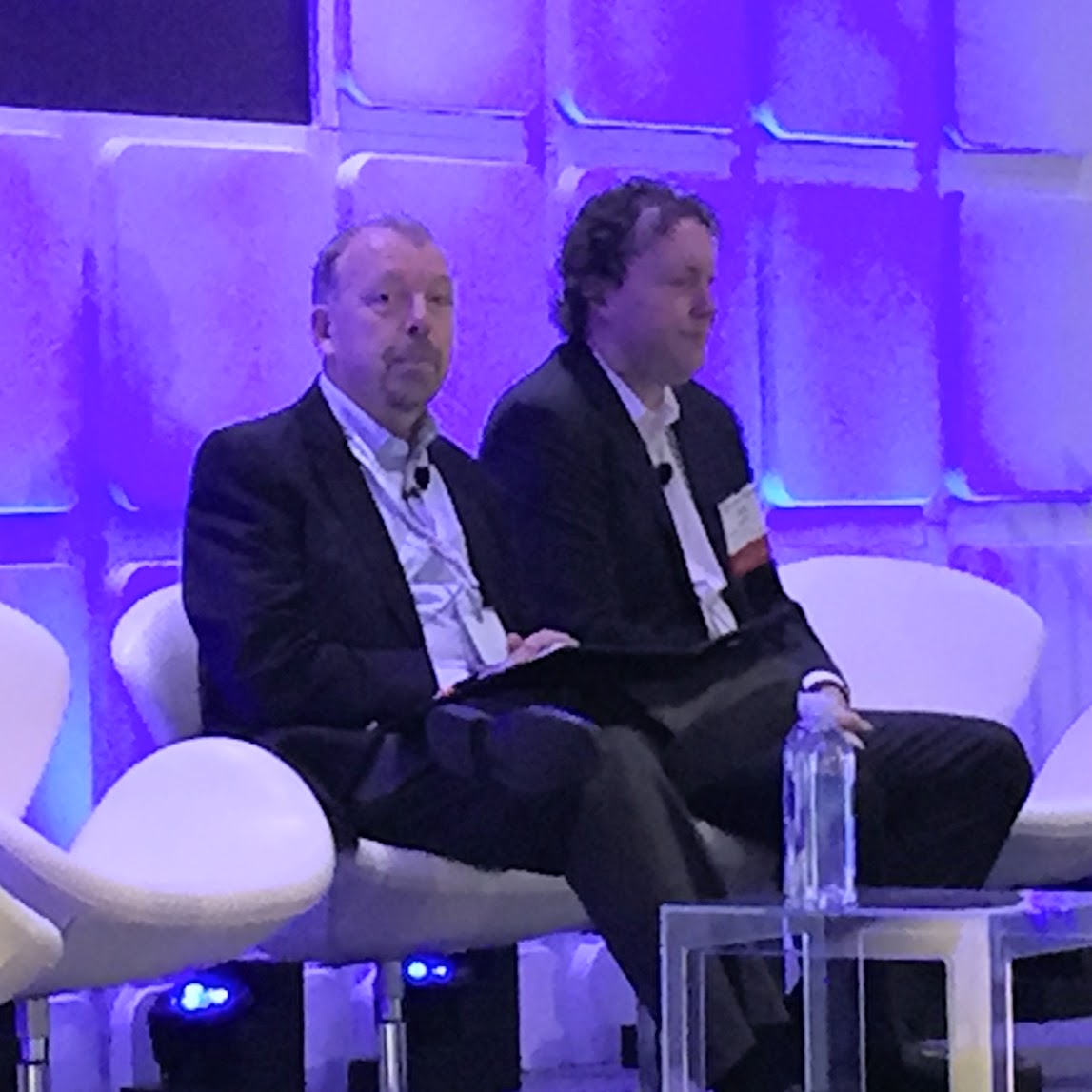 But during the live debate, Cagney cast the suggestion of there being no buyers aside. Companies like his are targeting large market segments, where there will theoretically always be demand at some price, not niche market segments that could dry up in a crisis. “The beauty of marketplace lending is we’re balance sheet light,” Cagney told the crowd while pointing out that banks get into trouble with lending because of how leveraged they are.
But during the live debate, Cagney cast the suggestion of there being no buyers aside. Companies like his are targeting large market segments, where there will theoretically always be demand at some price, not niche market segments that could dry up in a crisis. “The beauty of marketplace lending is we’re balance sheet light,” Cagney told the crowd while pointing out that banks get into trouble with lending because of how leveraged they are.
That viewpoint contrasted that of two Goldman Sachs VPs that told the same crowd earlier that marketplace lenders would eventually move towards keeping loans on their balance sheets.
SoFi is of course an exception to the mold of the average marketplace lender, which Baker made sure to point out. Most people in the room were aware of SoFi’s $4 billion private market valuation. It’s clear that Cagney knows what he’s doing, Baker said out of respect several times on stage. His comments were directed less at SoFi and more on marketplace lenders in general.
Baker worried that these loans were being classified as fixed income investments too soon. These loans are not backed by large corporations, he warned, but by consumers. They won’t act like fixed income investments forever, he said.
Cagney took the criticism in stride and basically chided Baker and those that share his concerns as being unwilling to pursue opportunities because they are simply afraid of change.
Someone knows where I am at all times, he jokingly warned the audience of bankers, in case any of them had planned to kidnap him and put an end to his disruptive endeavors.
SoFi’s brand is of being an anti-bank or a fixer of the broken banking system so Cagney no doubt expected doubters at a conference produced by American Banker’s parent company.
Baker told Cagney that he had a nice libertarian view that didn’t make sense over in the real world. Cagney gleefully accepted the label of libertarian and rejected the notion that the real world and the libertarian world weren’t one and the same.
The two agreed to cordially disagree and notably did not shake hands when the debate ended. Cagney, the anti-banker, appeared to win over a significant portion of the audience. To his credit, the conference was aptly named the Marketplace Lending and Investing conference, not the Traditional Banking Forever conference.
Both sides made valid arguments, but one thing is for certain, banking will never be the same.
Marketplace Lending and Investing Conference (Part 1)
November 5, 2015Source Media’s Marketplace Lending and Investing conference kicked off today with a bang. During the opening keynote, two VPs at Goldman Sachs predicted that the industry would shift to retaining loans on balance sheets instead of continuing with the gain-on-sale model. The irony is that OnDeck appears to be going in the opposite direction since their recent path to profitability is being made possible by their new reliance on gain-on-sales.

The available solutions presented to small business financing problems at the conference covered the entire gamut. Pango Financial president Candice Caruso for example, explained that small businesses can get funding by rolling over money from a qualified retirement plan. Pango’s model capitalizes on The Employee Retirement Income Security Act of 1974 (ERISA), a 40-year old law that can be streamlined with the help of technology. ERISA established the regulation that allows for a private company to use retirement funds as business capital through an Employee Stock Ownership Plan (ESOP).
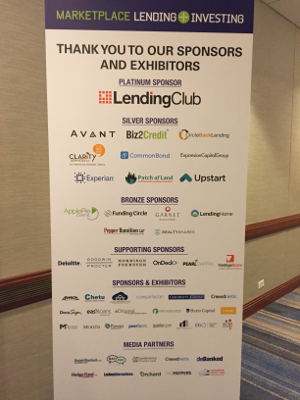 Companies like Pango have found a clever way to scale the benefits out of old policies and it’s opportunities like these that have everybody excited. QED Partners founder Frank Rotman summed it up best when he recited his own Wall Street Journal quote, “It feels like the Internet in 2000. Everyone is chasing it, but they aren’t sure what ‘it’ is.”
Companies like Pango have found a clever way to scale the benefits out of old policies and it’s opportunities like these that have everybody excited. QED Partners founder Frank Rotman summed it up best when he recited his own Wall Street Journal quote, “It feels like the Internet in 2000. Everyone is chasing it, but they aren’t sure what ‘it’ is.”
Rotman also cautioned lenders who are trying to throw money at technology as a fix to scale their businesses. You can’t just throw money at technology, he argued. “Technology needs to be in your DNA.”
For marketplace lenders like QuarterSpot, they fit that bill well. Their CEO Adam Cohen was the Chief Software Developer for JetBlue Airways.
And among some of the other names in attendance, many are on the fast track for success. Expansion Capital Group for example just closed a $25 million credit facility with Northlight Financial and Bastion Management. And there’s also Pearl Capital who was recently acquired by Capital Z Partners. And Herio Capital, founded by one of OnDeck’s earliest employees, recently reached a new funding milestone.
At the end of the day, Anjan Mukherjee, the Counselor to the Secretary and Deputy Assistant Secretary for Financial Institutions of the U.S. Treasury Department told attendees not to bank on regulatory interest being forgotten about with a new presidential administration. Certain agendas can be “de-emphasized”, he said, but overall at least as far as the Treasury is concerned, enough important people will not transition away. They won’t forget everything, he explained.
Join us at the Marketplace Lending and Investing Conference This Week
November 2, 2015The Marketplace Lending & Investing Conference produced by Source Media begins November 4th in New York City. Hosted at the New York Hilton Midtown, attendees are promised an all-star speaker lineup that includes Noah Breslow of OnDeck, Stephen Sheinbaum of Bizfi, Angela Ceresnie of Orchard, Sam Graziano of Fundation, Candace Klein of Dealstruck, Peter Renton of Lend Academy, and many more.
In the meantime, check out this preview podcast between the conference hosts and Sam Granziano, the CEO of Fundation.
Alternative Lenders Are Waiting for a Shakeout
October 28, 2015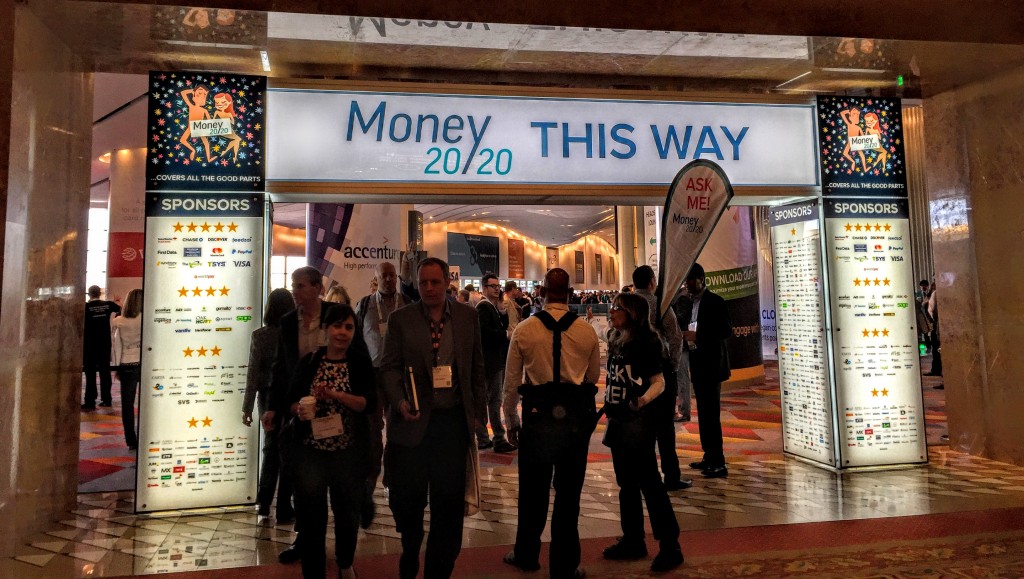 Back in April at the LendIt conference in New York, the big consensus was that not all underwriting was created equal and therefore several players wouldn’t survive long enough to make it back to LendIt in 2016. Six months later at Money2020 and so far everyone is still standing.
Back in April at the LendIt conference in New York, the big consensus was that not all underwriting was created equal and therefore several players wouldn’t survive long enough to make it back to LendIt in 2016. Six months later at Money2020 and so far everyone is still standing.
Loan terms are getting longer, rates cheaper and the cost to acquire borrowers higher. Somebody has to be feeling the pressure but in a rather benign economic and regulatory environment, it’s clear skies.
Valuations are soaring. SoFi is valued at more than $4 billion and Kabbage at more than $1 billion.
But Robert Greifeld, the CEO of Nasdaq warned attendees about the validity of private market valuations. “A unicorn valuation in private markets could be from just two people,” he said. “whereas public markets could be 200,000 people.” At best he described a private market valuation as being just a rough indicator.
And some wonder if these valuations are based on just scale, rather than the ability to underwrite more intelligently and efficiently than a bank. OnDeck for example, had a Compound Annual Growth Rate (CAGR) in originations of 159% from 2012-2014 when the average originations CAGR for their peers is currently 56%. But OnDeck has the advantage of time. With nearly a decade of data under their belt, they’ve been able to see what works and what doesn’t.
“You have to have enough bad loans to build a good credit model,” said OnDeck CEO Noah Breslow during a Money2020 panel discussion.
For Aaron Vermut, CEO of Prosper, getting their company to the next level was about having access to institutional capital. As a marketplace, and as a company that almost died several years ago, he pointed out, institutional money was the inflection point for them to grow. The peer-to-peer model that actually depended purely on “peers” is what held their company back.
One thing several lenders seemed to agree on was the limited applicability of FICO. FICO is not the thing to use for a small business loan, said Sam Hodges, Managing Director and Co-founder of Funding Circle. His words didn’t come as a surprise since credit scores are generally the domain of consumer lending.
But doubts about FICO’s ability to predict performance didn’t just come from the commercial finance side. Prosper’s Vermut explained that consumers still think their FICO score is the most important factor in the rate they get. So even though they’ve got a system to predict repayment outside of FICO, they’re kind of forced to incorporate it because consumers are being educated to believe that’s what matters most.
The irony was not lost that as Vermut said that on a panel, he was seated next to Kenneth Lin, the CEO and founder of Credit Karma, a company that educates consumers about credit. “A credit score is one of the most important components of a consumer’s financial profile,” says Credit Karma’s website. Such language puts a tech-based lender with their own scoring model perhaps at odds with what their own prospects believe.
For instance if a potential borrower with a 750 FICO score is offered a high interest rate because the lender’s advanced and more in-depth underwriting determined them to be high risk, they’re going to walk away confused.
That of course begs the question, who needs to change? Those educating consumers about credit scores or the lenders who are moving away from them?
Before educational services shift though, it would probably make sense if the lenders can prove that their non-FICO dependent systems will work in the long run. And the sentiment among many lenders is that there are plenty of flawed models out there that will inevitably fail. That makes a shakeout not just a matter of if, but when.
Six months after LendIt, everybody is still standing. Whispers from in and around Money2020’s halls and exhibit floor revealed that the confident lenders wish the correction would happen sooner rather than later but that they are prepared to wait however long it takes.
Right now, confidence about the future on the commercial finance side came in at an 83.7 out of 100, according to the Small Business Financing Report. While there are no other points of reference to compare that to, industry captains are generally very bullish.
That could mean that for those secretly under tremendous pressure already, you could be left waiting for a shakeout for a very long time.
LoanDepot to be Lending’s Next IPO?
October 9, 2015 loanDepot, which describes itself as a leading technology-enabled U.S. consumer lending platform, has publicly filed their S-1 registration form. Originating more than $50 billion worth of loans since 2010, that makes them the nation’s second largest direct-to-consumer non-bank originator. Their products range from home loans to unsecured personal loans.
loanDepot, which describes itself as a leading technology-enabled U.S. consumer lending platform, has publicly filed their S-1 registration form. Originating more than $50 billion worth of loans since 2010, that makes them the nation’s second largest direct-to-consumer non-bank originator. Their products range from home loans to unsecured personal loans.
The filing states they seek to raise $100 million, however that number might be revised upward. For loanDepot’s CEO Anthony Hsieh, this is business as usual. According to Crunchbase, he founded LoansDirect.com in 1994 and merged with ETRADE Financial in 2001 to create ETRADE Mortgage. His next company, Home Loan Center, Inc., merged with Lending Tree.
loanDepot is a natural succession to similar businesses he’s built over the past 20 years.
For Lending, It Might as Well be 1997
October 9, 2015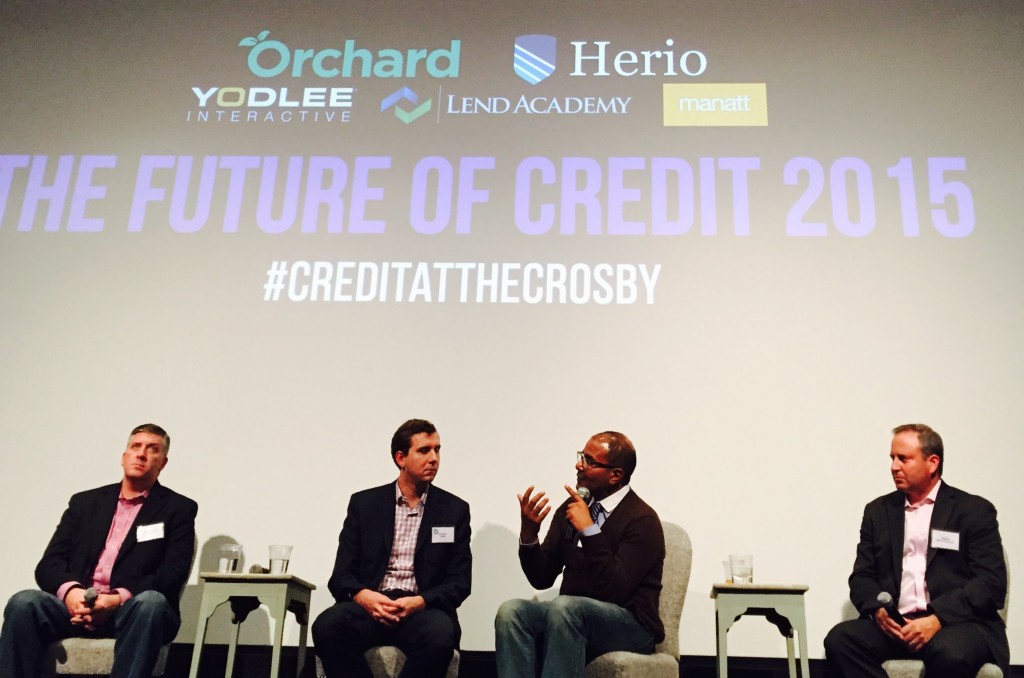 If you did any business with OnDeck between 2008 and 2014, you probably spoke with or at least knew of Sherif Hassan. His last position with the company before he left in May, 2014 was the Vice President of Major Markets. About six months later OnDeck went public and Hassan, one of the company’s earliest employees, was not there to celebrate it.
If you did any business with OnDeck between 2008 and 2014, you probably spoke with or at least knew of Sherif Hassan. His last position with the company before he left in May, 2014 was the Vice President of Major Markets. About six months later OnDeck went public and Hassan, one of the company’s earliest employees, was not there to celebrate it.
That’s because Hassan was busy working on something new, Herio Capital, a provider of working capital to small businesses that just recently surpassed more than $10 million in funding since inception.
Herio teamed up with Orchard on Thursday evening, September 8th to present The Future of Credit 2015.
“This is e-commerce in 1997 right now for lending,” said Jason Jones, a partner in Lend Academy who moderated the event’s panel. And Hassan, who is now easily considered an industry veteran, explained what set his new company apart.
It’s apparently not all algorithms when it comes to small business either. “We’re using our data to do all the heavy lifting and we’re using our people to do all the thinking,” Hassan said. And while they can take a deal from start to finish in four hours, they still have a human credit committee process. Other industry leaders have reported using similar approaches. “I like eyes on a deal,” said Orion First Financial CEO David Schaefer back in June at the AltLend conference. But for Herio, APIs and data allow the company to do a lot of filtering before anyone even touches the deal. Yodlee’s bank verification product reportedly plays a big role in being able to do that and Terry McKeown, Yodlee’s Data Practice Manager was coincidentally also on the panel.
Next to Hassan sat Matt Burton, the CEO of Orchard Platform, who was previously the 7th employee of Admeld, a company that was acquired by Google in 2011 for $400 million. His co-founder, Angela Ceresnie, is a former VP of Risk Management at Citibank and Director of Risk Management at American Express.
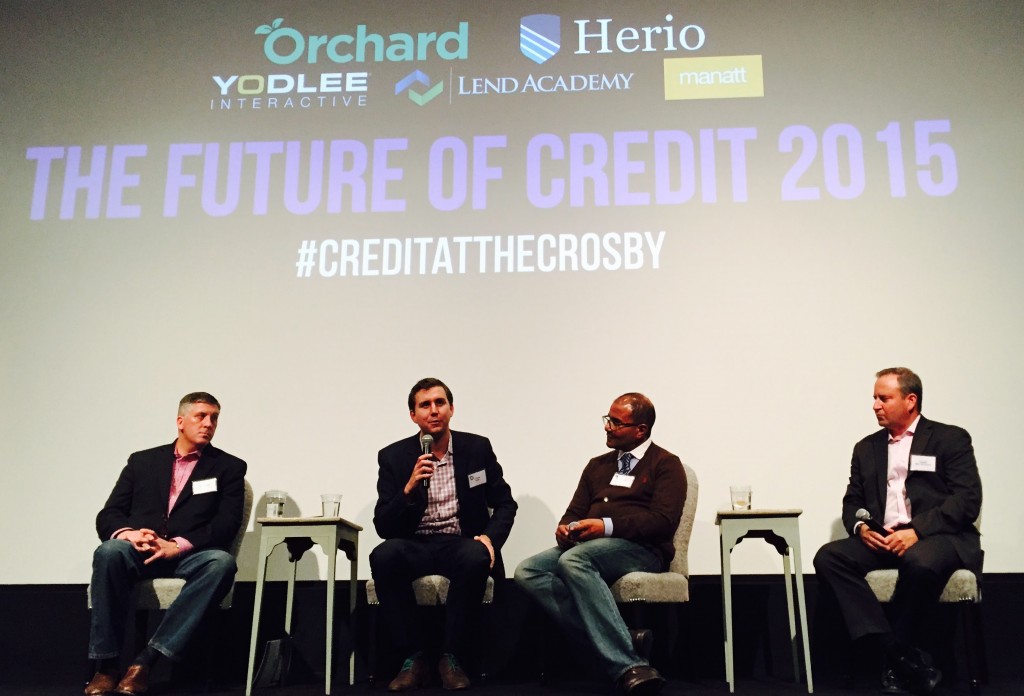 Speaking on the availability of decisioning tools, Burton said “there’s never been a better time to enter the space.” That may seem counter-intuitive since the frenzy of M&A activity and capital raising over the last couple years has had some players worried there’s a bubble brewing, but studies show they may just be filling a growing gap. Small business lending is actually shrinking in the traditional banking sector in part because of Dodd-Frank.
Speaking on the availability of decisioning tools, Burton said “there’s never been a better time to enter the space.” That may seem counter-intuitive since the frenzy of M&A activity and capital raising over the last couple years has had some players worried there’s a bubble brewing, but studies show they may just be filling a growing gap. Small business lending is actually shrinking in the traditional banking sector in part because of Dodd-Frank.
“Community banks are being destroyed,” said Burton. “All the products they used to be able to provide have been taken away.” That’s not just his opinion either. Three weeks ago, the heads of the Independent Community Bankers of America and National Association of Federal Credit Unions offered testimony to the House Small Business Committee that demonstrated the carnage that regulations were having on their industry. During that hearing, Subcommittee Chairman Tom Rice said, “the burdens created by Dodd-Frank are causing many small financial institutions to merge with larger entities or shut their doors completely, resulting in far fewer options where there were already not many options to choose from.”
So today’s online lending industry might seem really big but it’s relatively small when compared to the shoes they’re trying to fill. Case in point, nearly 10% of the 104 companies that responded to the Treasury RFI on marketplace lending attended Herio & Orchard’s three hour event in New York City. That was determined by a quick show of hands from the audience when asked by Manatt Phelps and Phillips attorney Brian Korn. The industry didn’t seem so big all the sudden.
Korn, making a lawyer joke, likened the Treasury RFI to the first discovery request in a lawsuit, but argued the Treasury Department is not really in a position to be the regulator in this space. He believed their motivation came down to, are we doing enough for small business and are we doing enough to protect consumers?
A more serious issue was the Madden v. Midland decision which has put National Bank Act preemption in uncertain legal limbo. For those still unsure what preemption means, Korn offered an example of a 16-year old obtaining a driver’s license in one state and driving to another state where the minimum driving age is 17. The driver can legally export their home state’s minimum driving age and drive in a state where the age limit is higher. It’s that model which is uncertain now thanks to Madden v. Midland, but with interest rates not with drivers’ licenses.
So what’s the Future of Credit as the event was so aptly named? One could argue that whatever the future is, Orchard and Herio will likely have a place in it. The panelists mostly agreed that while some online lenders might be at risk in the next credit cycle, the online lending concept is here to stay. That’s because the borrowers themselves have changed. Nobody’s going to want to walk into a bank anymore and fill out paperwork after this, they argued.
If Lend Academy’s Jason Jones was right about this being like e-commerce in 1997, then it’s certainly incredible to think that the future of credit is something we can hardly even imagine yet.
Lending Club is Transforming the Banking Industry
October 6, 2015Earlier today, Lending Club CEO Renaud Laplanche appeared on Bloomberg TV. When asked about the recent volatility in the financial markets, Laplanche said that he has seen no retrenchment from investors on their platform. But a future economic downturn is something they are prepared for, he explained, because the ’08 -’09 financial crisis taught them a lot.
Watch the short video interview below:
Not showing up? Click to see it here
OMG: Same Day ACH
September 25, 2015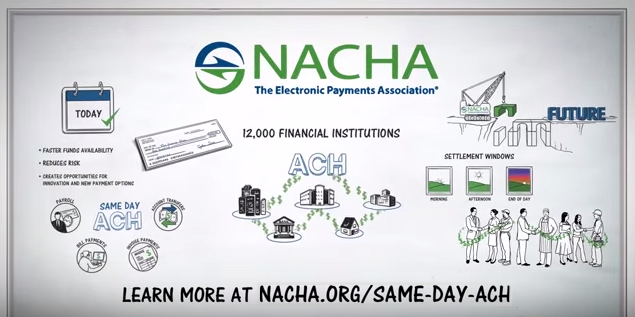 Coming soon, the ability to ACH funds same-day will finally exist. The change will be a boon to tech-based lenders that have become famous (or infamous) for their ability to approve and issue loans quickly. No matter how fast the systems have become however, the ACH network has continued to slow the process down.
Coming soon, the ability to ACH funds same-day will finally exist. The change will be a boon to tech-based lenders that have become famous (or infamous) for their ability to approve and issue loans quickly. No matter how fast the systems have become however, the ACH network has continued to slow the process down.
Next-day funding has long made borrowers skeptical about the online lenders they apply to and many applicants become anxious when they hear that the funds will be in their account tomorrow rather than today, after the deal has been closed.
Speaking from my own experience, there was almost nothing worse than telling a merchant that the funds had gone out and would be in their account the next day because they would disregard the last part of that statement and check their bank accounts immediately and of course would not see those funds. They’d immediately reach back out to me or the underwriter and say that they had been deceived because no money was there. This scenario played out on at least half of all the deals I ever worked on and it was awful.
And I’d remind them, “It’s an ACH. It’s overnight. It should be there in the morning depending on your bank. If for whatever reason it isn’t, give me a call.”
Even after repeating myself, I’d often get an email later that day at 6 pm (bank closing time) to say that they were at the bank and the teller has just told them that they don’t see any incoming wires.
So many merchants just could not believe that a tech-based funding company could not make the money appear instantly in their account and every passing second caused them more anxiety and fear that they had been tricked.
Enter Same Day ACH, which is slated to launch in September 2016. According to the National Automated Clearing House Association (NACHA), who governs the ACH network, there will be two settlement times.
A morning submission deadline at 10:30 AM ET, with settlement occurring at 1:00 PM.
An afternoon submission deadline at 3:00 PM ET, with settlement occurring at 5:00 PM.
Virtually all types of ACH payments, including both credits and debits, would be eligible for same-day processing, according to their announcement.
The industry can’t get Same Day ACH fast enough!
And if you thought you were excited about ACHing, just watch the below video produced by NACHA about how awesome their network is.






























